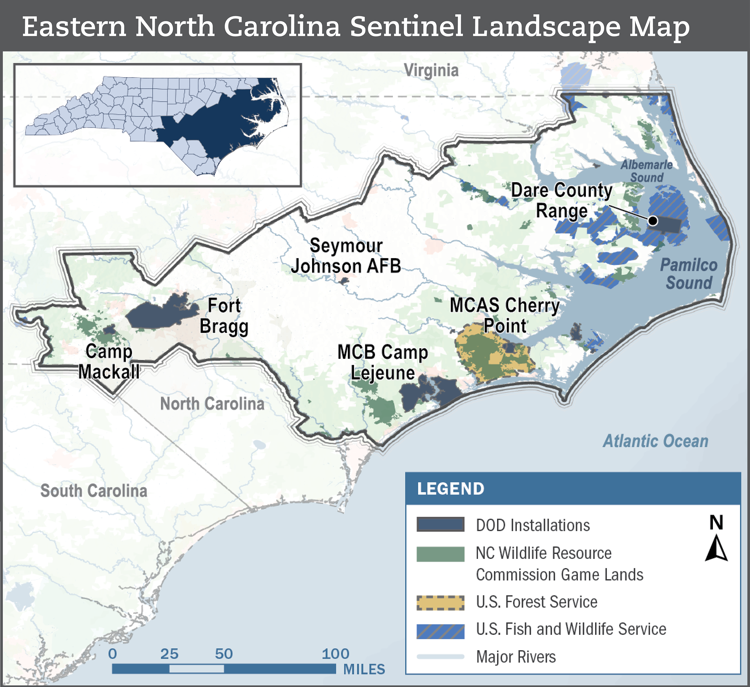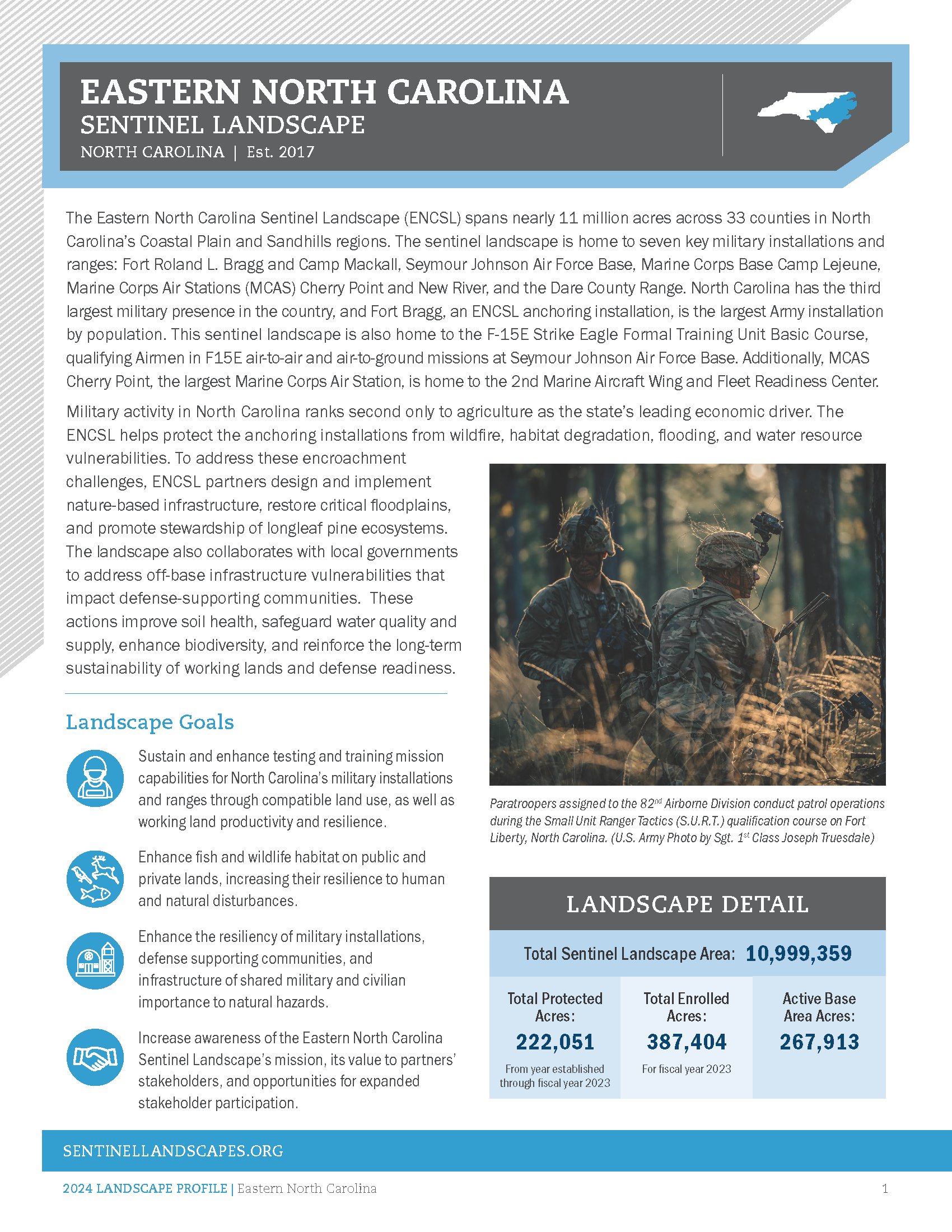Eastern North Carolina Sentinel Landscape
-
North Carolina
-
Established 2016
About
The Eastern North Carolina Sentinel Landscape (ENCSL) spans nearly 11 million acres across 33 counties in North Carolina’s Coastal Plain and Sandhills regions. The sentinel landscape is home to seven key military installations and ranges: Fort Roland L. Bragg and Camp Mackall, Seymour Johnson Air Force Base, Marine Corps Base Camp Lejeune, Marine Corps Air Stations (MCAS) Cherry Point and New River, and the Dare County Range. North Carolina has the third largest military presence in the country, and Fort Bragg, an ENCSL anchoring installation, is the largest Army installation by population. This sentinel landscape is also home to the F-15E Strike Eagle Formal Training Unit Basic Course, qualifying Airmen in F15E air-to-air and air-to-ground missions at Seymour Johnson Air Force Base. Additionally, MCAS Cherry Point, the largest Marine Corps Air Station, is home to the 2nd Marine Aircraft Wing and Fleet Readiness Center.
Military activity in North Carolina ranks second only to agriculture as the state’s leading economic driver. The ENCSL helps protect the anchoring installations from wildfire, habitat degradation, flooding, and water resource vulnerabilities. To address these encroachment challenges, ENCSL partners design and implement nature-based infrastructure, restore critical floodplains, and promote stewardship of longleaf pine ecosystems. The landscape also collaborates with local governments to address off-base infrastructure vulnerabilities that impact defense-supporting communities. These actions improve soil health, safeguard water quality and supply, enhance biodiversity, and reinforce the long-term sustainability of working lands and defense readiness.

Total Funding by Partner
| Partner | FY2015 | FY2016 | FY2017 | FY2018 | FY2019 | FY2020 | FY2021 | FY2022 | FY2023 |
|---|---|---|---|---|---|---|---|---|---|
| USDA | $6.72M | $7.63M | $9.33M | $7.39M | $11.04M | $6.88M | $10.88M | $13.44M | $7.50M |
| DOW | $0.00M | $0.00M | $0.00M | $0.00M | $0.00M | $0.00M | $0.00M | $0.00M | $0.00M |
| DOI | $1.13M | $0.13M | $1.14M | $0.63M | $0.99M | $0.00M | $0.18M | $0.00M | $0.06M |
| State | $2.45M | $5.85M | $4.92M | $5.25M | $3.25M | $6.78M | $21.60M | $10.10M | $30.87M |
| Local | $0.00M | $0.00M | $0.00M | $0.00M | $0.00M | $0.00M | $0.00M | $0.00M | $0.00M |
| Private | $2.36M | $2.01M | $4.83M | $4.67M | $6.92M | $7.74M | $0.00M | $0.00M | $0.23M |
| DoD | $7.90M | $6.59M | $19.64M | $4.92M | $4.20M | $5.62M | $7.00M | $1.80M | $7.33M |
Total Acres Protected and Enrolled
| Acres Protected (Since Designation) | 222052 |
|---|---|
| Acres Enrolled (During FY23) | 387405 |
Our Partners
Federal Partners
- U.S. Air Force - Seymour Johnson AFB and Dare County Range
- U.S. Army - Fort Roland L. Bragg and Camp MacKall
- U.S. Department of Agriculture, Farm Service Agency (FSA)
- U.S. Department of Agriculture, Forest Service and State Croatan National Forest
- U.S. Department of Agriculture, Natural Resource Conservation Service (NRCS)
- U.S. Department of Commerce, National Oceanic and Atmospheric Administration (NOAA)
- U.S. Department of Defense Office of Local Defense Community Cooperation (OLDCC)
- U.S. Department of Interior, National Park Service Rivers, Trails and Conservation Assistance Program
- U.S. Department of the Interior, Fish and Wildlife Service (USFWS)
- U.S. Department of the Interior, National Park Service (NPS)
- U.S. Department of War, Readiness and Environmental Protection Integration (REPI)
- U.S. Marine Corps - MCB Camp Lejeune, MCAS Cherry Point, MCAS New River
- U.S. Navy, Navy Region Mid Atlantic
State Partners
- Albemarle-Pamlico National Estuary Partnership
- NC College of Natural Resources - NC State University
- NC Department of Agriculture and Consumer Services
- NC Department of Commerce
- NC Department of Military and Veterans Affairs
- NC Department of Natural and Cultural Resources
- NC Department of Transportation
- NC Sea Grant
- NC Wildlife Resources Commission
Private Partners
- America's Longleaf and Local Implementation Teams
- Brooks Pierce
- Cape Fear Arch Conservation Collaboration
- Conservation Finance Network
- Conservation Legacy Conservation Corps of NC
- Conservation Trust for NC
- Environmental Defense Fund
- Mountains to Sea Trail
- Mt Olive University
- National Fish and Wildlife Foundation
- NC Coastal Federation
- NC Coastal Land Trust
- NC Grange
- NC Land of Water
- NC Sandhills Conservation Partnership
- NC Sandhills Prescribed Burn Association
- North Carolina Military Business Center
- Onslow Bight Conservation Forum
- South Atlantic Landscape Conservation Cooperative
- Southern Group of State Foresters
- Sustainable Forestry and African American Land Retention
- The Coastal Land Trust
- The Conservation Fund
- The Nature Conservancy
- Three Rivers Lands Trust
- Triangle Land Conservancy
Resources
-

Eastern North Carolina Sentinel Landscape Profile
Meet the Coordinator

Chris Baillie
Chris Baillie is the Resilience Coordinator for the Eastern North Carolina Sentinel Landscape (ENCSL), a three year pilot position to evaluate the benefits of Landscapes having a second coordinator to focus on projects addressing landscape resilience. In this role, Chris will be leading a broad group of stakeholders in the development of a Strategic Resilience Plan for the ENCSL while concurrently facilitating the development of proposals to support resilience-focused projects within the Landscape. Chris is originally from Durham, NC, and holds a Ph.D. in Ecology, Evolution, and Marine Biology from Northeastern University and a Bachelor of Science in Biology from the University of North Carolina at Chapel Hill. With expertise in habitat conservation and restoration, ecosystem service quantification, and coupled human-natural system management, Chris has extensive experience translating applied research and stakeholder engagement into actionable State-level plans. Outside of work, Chris is an outdoors enthusiast.